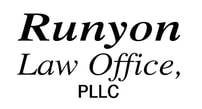More Medicaid . . . and More
Let's get at it by way of examples. Say you received a generous gift of $50,000 from mom less than 5 years before she needed Medicaid benefits for nursing care. As you know if you read my last Medicaid entry, there's a "look-back" period of 5 years before a gift like that would escape consideration by the Medicaid folks.
What the new law says is if you're the recipient of that gift, you can be held liable to the nursing home for mom's bill there, up to the full amount mom gave you. It's a complicated calculation to determine the actual reimbursement obligation, but the takeaway is that you're running an expensive risk if you spend those funds before the 5 year look-back period expires. Instead, what you probably should do during that time is deposit the windfall in a safe investment instrument, and then wait until the 5th anniversary of the gift to break out the champagne. If you've spent the funds prematurely, you may find a Medicaid lien on your own assets when you no longer have enough to pay mom's nursing home bill.
The other shoe that the new law drops may land on someone who holds a power of attorney for the nursing home resident. So let's say that you have mom's POA to pay her bills, but now she's run out of money and doesn't have enough to pay the nursing home. If you neglect to file for Medicaid after she takes up residence there, resulting in bills that might have been paid by Medicaid, you could be held personally liable for them in this instance, too. The lesson here is that on the same day you move mom into the nursing home, you'd better leave time to get to the Medicaid office to begin what I referred to last time as her "resource assessment". Remember, that's the process of reviewing her income and assets to find out whether she qualifies for Medicaid from day one - or has to do some "spending down" of her funds beforehand.
OK, that's the sobering essence of the new Medicaid law. But permit me, if you will, to make several general observations that are prompted by this state of affairs. Many of us serve as agents under the POAs of elderly or disabled parents, siblings, even friends - and when Medicaid isn't an issue at all. We think of ourselves as generously helping out the people we care about and it makes us feel good - am I right? But we certainly don't expect to be exposing our own assets to any of their obligations, at least as long as we don't run off with the funds - right again? The rub may come, though, when we're not paying as much attention as perhaps we should. Maybe mom has stock in a firm that's well known to be on the rocks, but we don't sell the investment before it finally tanks. Maybe we leave her funds languishing in an anemic checking account while the market is soaring, or in a mutual fund where the fees are eroding the non-performing principal. Or maybe we don't ensure that her taxes or insurance premiums are being paid, and penalties or losses accrue that might have been avoided. The list is as long as the ways we could mess up our own affairs.
The question is, who's responsible when our neglect - there's that word again - causes those losses? Look at it this way: If we fell asleep at the wheel while driving mom's car and we ran it into a tree, we'd certainly have to pay up for the injuries and damages. I'm suggesting the same thing could happen if we don't pay attention while in charge of her financial vehicles. Don't get me wrong, though. I'm not suggesting we abandon all our good-guy tendencies toward our loved ones; I'm just urging that if we've taken on responsibilities under their POAs, we'd better sit up and pay attention - and drive carefully. We wouldn't want to wreck our own car, and we certainly don't want to pay for wrecking someone else's.
Posted 10/21/2013
